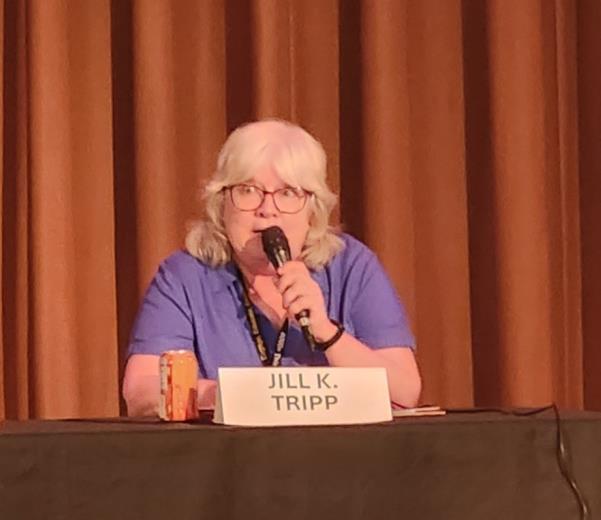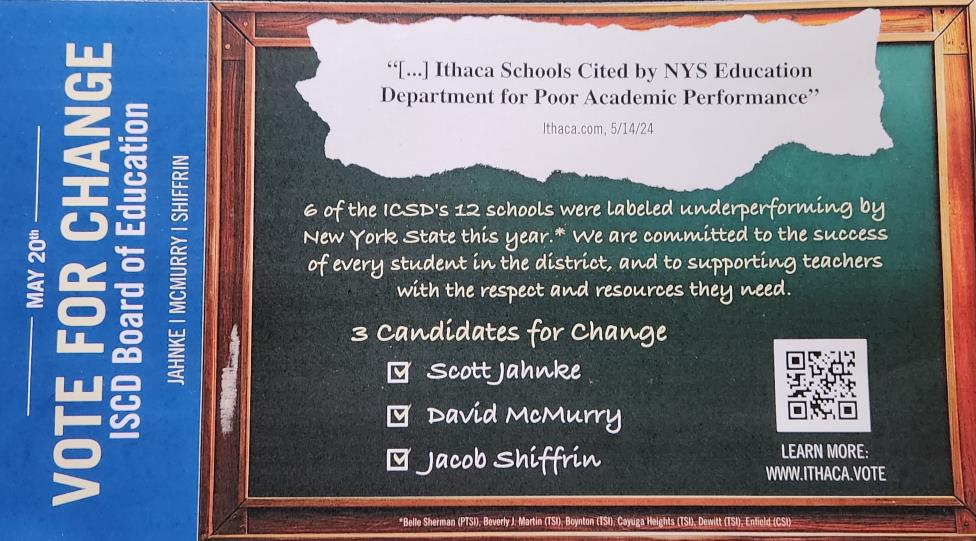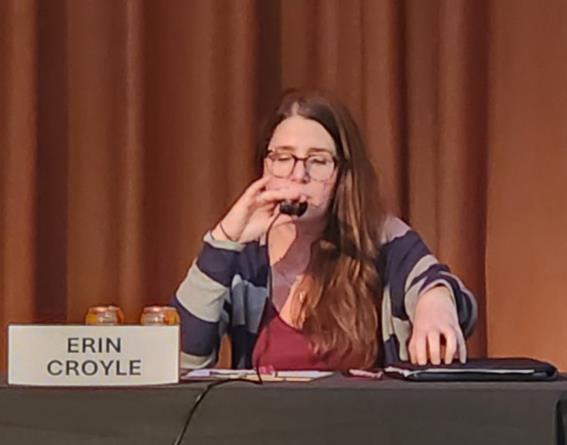Ithaca Budget passes; reformers struggle

by Robert Lynch; May 20, 2025; expanded coverage May 21, 2025
This year was not last year. And results from Tuesday’s Ithaca City School District (ICSD) school board elections show a return to what might be called the predictable: Budgets pass by wide margins; and candidates endorsed by the teachers union gain the advantage over those who weren’t.
Updated, official results posted late Wednesday on the ICSD’s website, not significantly different from earlier preliminary numbers, show newcomer Jacob Shiffrin, incumbents Karen Yearwood and Erin Croyle, plus another newcomer, Madeline Cardona, finishing in sequential order for the four school board seats open in this year’s election.
Shiffrin, Yearwood, Croyle, and Cardona were endorsed by the Ithaca Teachers Association, the district’s influential instructional union.
The only incumbent who lost stands notable by her defeat. Jill Tripp, regarded by many as a budget hawk and the taxpayer’s friend, lost the election, coming in fifth and falling 113 votes behind Cardona.

The proposed $169 Million 2025-26 district budget, meanwhile, breezed to approval, as did a proposition to appropriate money for school buses and building improvements.
The proposed budget won voters’ support, 3,756 votes (77.7%) to 1,078 votes (22.5%) opposed.
The bus and building expenditures secured almost identical support; 3,733 votes (77.4%) in favor; 1,089 votes (22.6%) opposed.
Tuesday’s results may signal that taxpayer frustration, which propelled a massive budget defeat in first round voting last year, may have now subsided. This year’s results more closely mirror the comfortable ICSD budget approval margins of earlier years.
The top three vote-getters in the May 20 ICSD election—Shiffrin, Yearwood, and Croyle—will each assume new, three-year terms beginning in July. Fourth-Place finisher Cardona will serve the remaining one-year of a board vacancy, and would need to run again next year to keep her seat.
In the latter days of this year’s Ithaca School Board campaign, three of the newcomers, Shiffrin, Scott Jahnke, and David McMurray, formed a coalition slate and marketed themselves as reformers. Of the three, only union-endorsed Shiffrin won.
Updated, official tallies placed Jacob Shiffrin in the lead with 3,492 votes; Karen Yearwood securing second place with 2,932 votes, followed by Erin Croyle with 2,709 votes, and Madeline Cardona with 2,351 votes.
Jill Tripp fell out of the running with 2,238 votes, followed by Scott Jahnke with 2,019 votes, and David McMurry with 1,960 votes.
The Ithaca Board of Education unanimously certified the election results the following night, Wednesday, May 21. The meeting took less than a minute. Jill Tripp seconded the motion that confirmed her defeat.
Newfield, like Ithaca, dodged the budgetary bullet Tuesday. As in Ithaca, Newfield’s school budget failed in its first presentation to the voters last year. But the Newfield budget, like Ithaca’s, comfortably won in this more welcoming of election years.
The Newfield budget passed, 342 votes (68%) to 159 (32%). A separate proposition to buy one wheelchair-accommodating school bus passed 381 votes to 120. A second proposition to buy an electric school bus proved much closer, passing by a mere 13 votes, 257 to 244.
In a crowded, seven-way contest for the Newfield Board of Education, George Taylor, Christina Ward, and Antwane Lynch prevailed. Taylor got 297 votes, Ward 251 votes, and Lynch 248 votes.
In the Trumansburg district, the school budget passed by a lopsided 528 to 101 margin. A Vehicle and Equipment Capital Reserve Fund Proposition secured voter passage, 533 votes to 93. Suzanne Organ, Jim Mielty and James Kemmerer won election to the school board there.
****
Madeline Cardona has become this year’s freshest new face to grace local school politics, given her Tuesday win for a seat on the Ithaca Board of Education. Cardona drives for Uber, holds only a High School degree, and moved to Pennsylvania from Puerto Rico at the age of 16. A single mom, Madeline has two teenagers who attend Ithaca High School.

Cardona will become the only Latinx on the Ithaca School Board, either this coming year or at any time in recent history.
“I’m running for the Board to give a chance to families like mine; somebody who cares and works hard as a single mom.” Cardona proudly told a candidates’ forum May 15 at Beverly J. Martin Elementary School. It was the only occasion all seven candidates met together on the same stage.
And that night, Cardona was the only candidate who declined to say how she’d vote on the proposed school budget. (All others said they’d support it.)
I’m “not fully educated” on the budget, Cardona candidly informed attendees. Instead, she said, “I come as a single mom,” and then promised, “If elected, I do plan to get educated and become familiar with the budget.”
Some might have viewed Cardona’s acknowledged fiscal ignorance as a gaffe, as a disqualifier, and assigned it the only misstep during the two-hour debate. But district voters may not have seen it that way. In the election, voters awarded the newcomer the opportunity to serve, if only, initially, for a single year.
Madeline Cardona had other opinions to share that evening.
“I don’t believe that law enforcement should be in our schools,” the soon-to-be member-elect said when the issue of immigration officers entering school buildings came up. “A lot of our children do not feel safe in our schools,” Cardona responded when candidates were later asked whether New York’s newly-imposed ban on student cell phone use might compromise pupil safety.
It’s said campaign cash buys votes. Perhaps it does some times. But in the Ithaca School Board contest it didn’t buy enough of them. Candidates Jacob Shiffrin, Scott Jahnke, and David McMurry joined forces to purchase yard signs and to mail a slick, oversized postcard to voters’ mailboxes. For many, it was the only contact they had with any candidate.

In the election, Jacob Shiffrin came in first. But Jahnke and McMurry fell to the back of the pack. The trio’s wildly-divergent political fortunes may be explained by the fact that Shiffrin won the teachers union’s endorsement, and the other two did not.
Karen Yearwood’s victory ensured the continued presence of two African-Americans—she and Board President Sean Eversley Bradwell—on the Ithaca Board of Education. Meanwhile, third-place victor Erin Croyle, who’ll commence her third, three-year term this summer, provides the school board a continued voice for disabled students’ rights.
Raising—and educating—a child with Down syndrome “changed my entire life,” Croyle told the May 15 candidates’ forum. At board meetings, Croyle has advocated for main-streaming learning disabled students. She’s also fought for higher budgets and heightened educational funding. Consider Croyle perhaps the ICSD board’s most liberal member.
How does Erin Croyle view the state of Ithaca school finances, amidst recent efforts to reduce the funding she’d prefer get spent? “The pandemic hit, and we’ve been in triage ever since,” Croyle told candidates’ forum attendees.

It may be the cruelest of ironies that the relatively stable 2025-26 Ithaca School Budget that Jill Tripp worked hard to engineer may have been what cost her the election.
Last year, amid skyrocketing residential assessments and what was initially proposed as a 12 per cent hike in the tax levy, Ithaca district voters had a taxpayer tantrum. Seven out of ten of them rejected the first proposed budget put in front of them. They later ratified a revised spending plan only after Tripp had led the effort to trim spending back.
But this year the (now-approved) $169 Million budget grew the tax levy by only 3.76 percent—a number tied to this year’s state-calculated “tax cap. Because of Tripp’s efforts, the broader electorate may have shrugged, have become complacent. It’s been reported just one person showed up for a mid-May budget hearing.
Meanwhile, last year’s spending cuts, dictated by frugality, have taken their bite out of school programs, cancelling at least one language offering at Ithaca High School and reducing administrative and teaching staff through attrition.
This was a year for Ithaca teachers and some parents to vent their anger in a different way. Unionized instructors are also angling for a pay raise larger than what district administrators have offered so far.
“I’m frustrated as a parent and a taxpayer,” second-to-last-place finisher Scott Jahnke had told the candidates’ forum last week. Jahnke complained that as many as six schools—including Enfield Elementary and both of Ithaca’s middle schools—have been cited by New York State for poor academic performance.
“We need a change now; we need to see that the community gets what it needs,” Jahnke had said.
But what is that need? Neither runaway budgets nor schools placed in detention study hall by their Albany taskmaster seem to have propelled the outcome of this year’s Ithaca City School District elections. Other issues were put in play; other speakers stood on the soap box, what little they did This was not Scott Jahnke’s year. Nor was it Jill Tripp’s.
###

